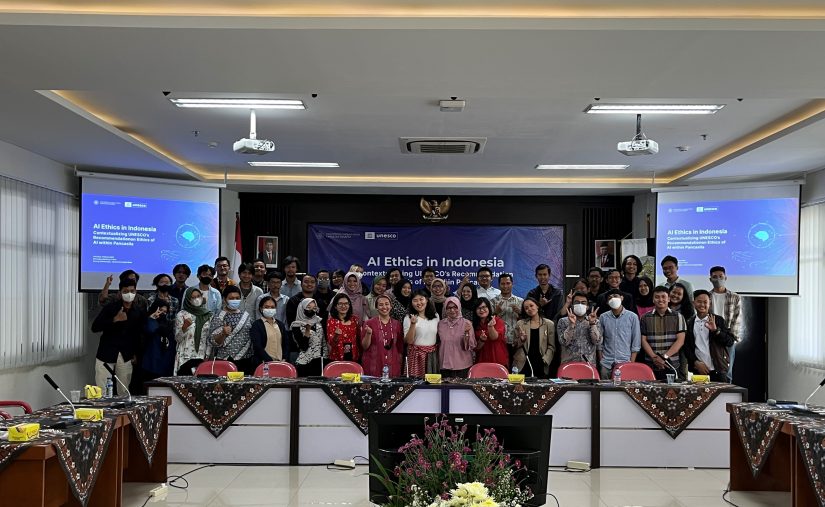
The Faculty of Philosophy at UGM (Universitas Gadjah Mada) and UNESCO have agreed to provide recommendations on the ethics of Artificial Intelligence (AI) in Indonesia during a series of webinar events titled “AI Ethics in Indonesia: Contextualizing UNESCO’S Recommendation on Ethics of AI within Pancasila”, held on Thursday, 16th March 2023. This webinar is a continuation of references and basic research recommendations on the ethics of Artificial Intelligence based on the values of Pancasila.
The agenda was opened by Ignatius Susatyo Wijoyo, M.M., serving as the Vice Rector for Research, Business Development, and Collaboration at UGM. He expressed his hope that “this Pancasila-based AI ethics research is not just a recommendation but can also be applied in daily life, thus making a real contribution to society in facing technological disruptions in the future.”
The dialogue began with presentations by Undral Ganbaatar, the Programme Specialist of the Social and Human Science Unit at UNESCO, and Dr. Rr. Siti Murtiningsih, the Dean of the Faculty of Philosophy at UGM. The event was moderated by Rona Utami, M. Fil. Undral Ganbaatar explained that there is a strategy implementation to build AI grounded in humanity-oriented ethics. “This strategy begins with a national-scale research project that collaborates between the community’s worldview based on Pancasila values and UNESCO’s recommendations on applied AI ethics in the future,” added Ganbaatar.
Dr. Rr. Siti Murtiningsih then detailed how the values of Pancasila are implemented as an approach and recommendation for Artificial Intelligence ethics. Technically, the five fundamental values of Pancasila, which are still considered abstract-universal, need to be translated clearly and concretely, such as in the form of AI ethics recommendation rules. Actual implementation can begin by analyzing the extent to which AI ethics work in the context of rules of transparency, capability, sustainability, adaptation, resilience, credibility, public space, democracy, and so on.
The discussion session continued with the two main speakers and Meyda Nento, the Associate Project Officer for Social and Human Science at UNESCO Jakarta, and Taufiqurrahman, S.Fil., M.Phil., a lecturer at the Faculty of Philosophy at UGM. In this second session, several participants asked about the progress of AI and its implementation at both local and international levels, including the extent to which Pancasila-based AI can impact the global AI discourse.
“The hope is that the launch of the AI Ethics policy recommendations within Pancasila can provide room for further research in the academic world and concrete references for the development of AI ethics in real life,” added Murtiningsih when closing the dialogue session. The launch ended with a note of agreement and a friendly gathering by participants and UNESCO representatives, along with faculty and leaders of the Faculty of Philosophy at UGM.
